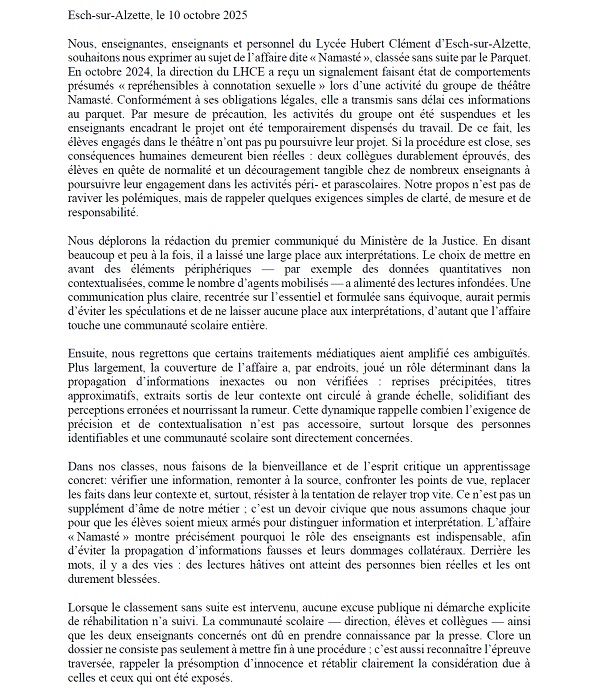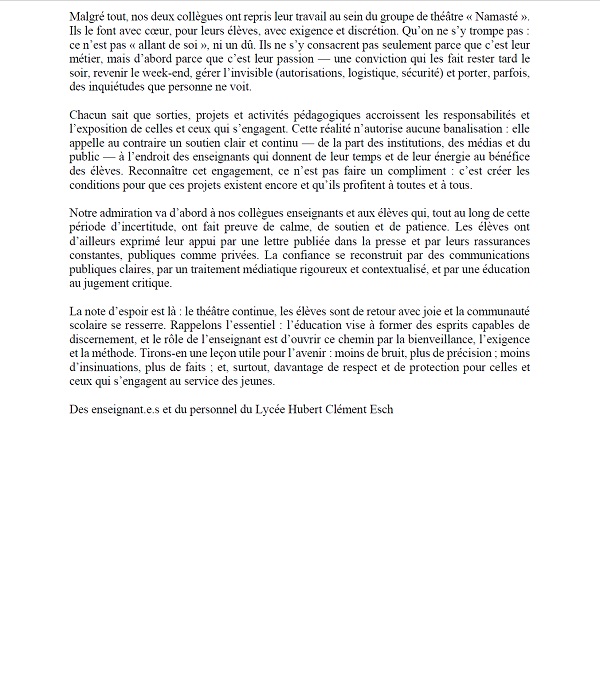The Lycée Hubert Clément in Esch-sur-Alzette has issued an open letter following the conclusion of the investigation into its school theatre group, Namasté.
On Monday 6 October 2025, the Luxembourg Public Prosecutor’s Office issued a statement on the investigation. It noted that a preliminary investigation had been opened following a report received in October 2024 “alleging serious acts with a sexual connotation that may constitute criminal offences”. The report led to the implementation of investigative measures, including searches carried out in January 2025, as well as several hearings and interrogations conducted by judicial police officers.
The Public Prosecutor’s Office said that while certain behaviour identified during the inquiry could be considered “questionable from a professional or ethical perspective”, the existence of criminal offences - including sexual abuse - had not been established. The criminal investigation has therefore been closed, and the Luxembourg Public Prosecutor's Office has dismissed the matter. It specified that the decision “concerns exclusively the criminal assessment of the facts. It does not prejudge any possible disciplinary, administrative or civil action that may be taken by other competent authorities.”
In their open letter dated Friday 10 October 2025, the school’s teachers and staff reflected on the human and professional consequences of the case within their community, calling for clearer institutional communication, more responsible media coverage and continued support for educators.
The full letter (in French) can be viewed below this translated version:
We, teachers and staff of the Lycée Hubert Clément in Esch-sur-Alzette, wish to express our views regarding the so-called “Namaste” case, which was closed by the Public Prosecutor's Office. In October 2024, the LHCE management received a report of alleged “reprehensible behaviour with sexual overtones” during an activity of the Namasté theatre group. In accordance with its legal obligations, it immediately forwarded this information to the Public Prosecutor's Office. As a precautionary measure, the group's activities were suspended and the teachers supervising the project were temporarily excused from work. As a result, the students involved in the theatre were unable to continue their project. While the proceedings are closed, their human consequences remain very real: two colleagues who have suffered lasting hardship, students in search of normalcy and a tangible discouragement among many teachers to continue their involvement in extracurricular and extracurricular activities. Our aim is not to rekindle controversy, but to reiterate a few simple requirements for clarity, moderation and responsibility.
We deplore the wording of the Ministry of Justice's first press release. By saying both a lot and a little, it left plenty of room for interpretation. The choice to highlight peripheral elements - for example, uncontextualised quantitative data, such as the number of officers mobilised - has fuelled unfounded interpretations. Clearer communication, refocused on the essentials and formulated unequivocally, would have avoided speculation and left no room for interpretation, especially since the case affects an entire school community.
We also regret that some media coverage has amplified these ambiguities. More broadly, coverage of the case has, in some places, played a decisive role in the spread of inaccurate or unverified information: rushed reprints, approximate headlines and excerpts taken out of context have circulated widely, solidifying erroneous perceptions and fuelling rumours. This dynamic is a reminder that the need for precision and contextualisation is not incidental, especially when identifiable individuals and a school community are directly involved.
In our classes, we make kindness and critical thinking a concrete learning experience: verifying information, going back to the source, comparing points of view, placing facts in their context and, above all, resisting the temptation to relay too quickly. This is not an extra element of our profession; it is a civic duty that we assume every day so that students are better equipped to distinguish between information and interpretation. The "Namaste" affair demonstrates precisely why the role of teachers is essential, in order to prevent the spread of false information and its collateral damage. Behind the words, there are lives: hasty readings have reached very real people and severely injured them.
When the case was closed, no public apology or explicit steps towards rehabilitation followed. The school community - administration, students and colleagues - as well as the two teachers involved must have learned of this through the press. Closing a case is not just about ending a procedure; it is also about acknowledging the ordeal endured, recalling the presumption of innocence and clearly reestablishing the consideration due to those who were exposed.
Despite everything, our two colleagues have returned to their work within the "Namaste" theatre group. They do it with heart, for their students, with rigour and discretion. Make no mistake: it is not "self-evident", nor a given. They devote themselves to it not only because it is their job, but first and foremost because it is their passion - a conviction that makes them stay late at night, come back on weekends, manage the invisible (permits, logistics, security) and sometimes bear concerns that no one sees.
Everyone knows that outings, projects and educational activities increase the responsibilities and exposure of those who get involved. This reality does not allow for any trivialisation: on the contrary, it calls for clear and continuous support - from institutions, the media and the public - for teachers who give their time and energy for the benefit of students. Recognising this commitment is not a compliment: it is creating the conditions for these projects to continue to exist and benefit everyone.
Our admiration goes first to our teaching colleagues and students who, throughout this period of uncertainty, have shown calm, support and patience. The students have also expressed their support in a letter published in the press and by their constant reassurances, both public and private. Trust is rebuilt through clear public communications, rigorous and contextualised media coverage and education in critical judgment.
The note of hope is there: the theatre continues, the students are joyfully returning and the school community is growing closer. Let us remember the essential: education aims to form minds capable of discernment and the role of the teacher is to open this path through kindness, rigour and method. Let us draw a useful lesson from this for the future: less noise, more precision; fewer insinuations, more facts; and, above all, more respect and protection for those who commit themselves to serving young people.










